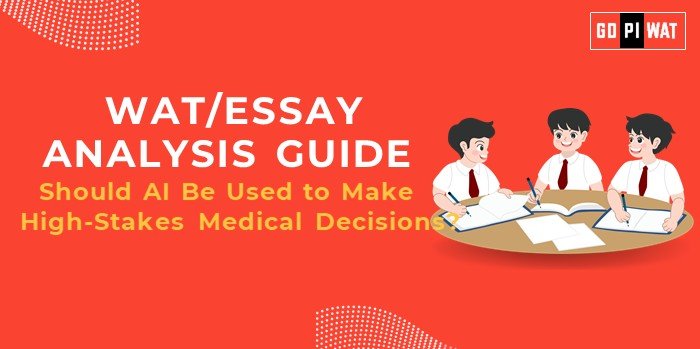📋 Group Discussion (GD) Analysis Guide
🤖 Should AI Be Used to Make High-Stakes Medical Decisions?
🌐 Introduction
- Context Setting: AI is transforming healthcare globally, offering enhanced accuracy and efficiency in diagnostics and treatment. However, ethical and practical concerns arise when delegating high-stakes decisions, such as surgery prioritization or life-support allocation, to machines.
- Background: In India, the healthcare AI market is growing rapidly, signifying its increasing role. Despite its potential, concerns about bias and lack of inclusivity require attention to ensure fair and ethical implementation.
📊 Quick Facts & Key Statistics
- 💰 Market Growth: AI in India’s healthcare market is projected to grow at a 40.6% CAGR, reaching $1.6 billion by 2025.
- ⚙️ Error Reduction: AI can significantly enhance efficiency and reduce physician burnout, addressing critical errors in healthcare delivery.
- 📈 Adoption Rates: Currently, 12% of Indian clinicians use AI in decision-making; this figure is expected to rise to 79% in the next 2-3 years.
- ⚠️ AI Bias: Limited dataset diversity in AI models poses risks of bias, potentially disadvantaging women and rural patients.
👥 Stakeholders and Their Roles
- Healthcare Providers: Integrate AI into workflows for diagnosis and treatment optimization.
- Technology Developers: Ensure AI systems are trained on diverse, inclusive datasets.
- Patients and Advocacy Groups: Demand fairness and transparency in AI-based decisions.
- Regulators: Establish ethical frameworks to safeguard against misuse and bias.
🏆 Achievements and Challenges
Achievements:
- ⚡ Efficiency Gains: AI streamlines diagnostic and operational workflows, reducing physician burnout.
- ✅ Error Reduction: Significantly decreases medical errors, improving patient safety.
- 🔍 Predictive Analytics: AI identifies high-risk patients earlier, enabling preemptive interventions.
Challenges:
- ⚠️ Bias Risks: Disadvantaging women and rural patients due to insufficient representation in datasets.
- ❓ Ethical Concerns: AI deciding life-critical outcomes without human empathy.
- 📉 Low Current Adoption: Despite its potential, only 12% of Indian clinicians currently use AI in decision-making.
🗣️ Effective Discussion Approaches
Opening Approaches:
- 💡 Data-driven: “AI in Indian healthcare is expected to grow to $1.6 billion by 2025, revolutionizing decision-making but raising ethical challenges.”
- 🔄 Contrast-based: “While AI reduces physician burnout, its potential biases against marginalized groups question its fairness.”
Counter-Argument Handling:
- Highlight AI-human collaboration as a way to balance efficiency with empathy.
- Propose strategies to improve dataset inclusivity and algorithm transparency.
📈 Strategic Analysis of Strengths & Weaknesses
- 💪 Strengths: Increases efficiency, reduces errors, enables predictive care.
- ⚠️ Weaknesses: Bias risks, lack of inclusivity, and dependency on unregulated AI systems.
- 🌟 Opportunities: Rapid adoption among Indian clinicians, growing healthcare investments.
- ⛔ Threats: Public distrust, ethical concerns, and potential misuse.
📌 Structured Arguments for Discussion
- 🟢 Supporting Stance: “AI’s ability to reduce medical errors and enhance efficiency makes it indispensable for high-stakes healthcare decisions.”
- 🔴 Opposing Stance: “AI lacks the emotional intelligence and nuanced understanding essential for life-and-death decisions.”
- ⚖️ Balanced Perspective: “While AI can support high-stakes decisions with data-driven insights, final responsibility should rest with human experts to ensure ethical care.”
🎓 Connecting with B-School Applications
- 📚 Real-World Applications: AI’s role in operational efficiency, patient care optimization, and ethical decision-making in healthcare management.
- ❓ Sample Interview Questions:
- “How can AI be integrated into healthcare while minimizing bias?”
- “What safeguards should regulators impose for AI in high-stakes decisions?”
- 💡 Insights for Students: AI applications inspire innovative projects in technology management and operational strategy.


